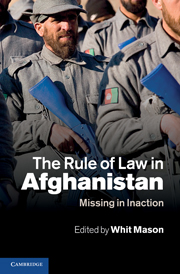Book contents
- Frontmatter
- Contents
- Contributors
- Preface and acknowledgements
- 1 Introduction
- PART I The scope and nature of the problem
- PART II The context
- 4 The international community's failures in Afghanistan
- 5 The rule of law and the weight of politics
- 6 Human security and the rule of law
- PART III The political economy of opium
- PART IV Afghan approaches to security and the rule of law
- PART V International interventions
- PART VI Kandahar
- PART VII Conclusion
- Index
- References
5 - The rule of law and the weight of politics
Challenges and trajectories
Published online by Cambridge University Press: 01 June 2011
- Frontmatter
- Contents
- Contributors
- Preface and acknowledgements
- 1 Introduction
- PART I The scope and nature of the problem
- PART II The context
- 4 The international community's failures in Afghanistan
- 5 The rule of law and the weight of politics
- 6 Human security and the rule of law
- PART III The political economy of opium
- PART IV Afghan approaches to security and the rule of law
- PART V International interventions
- PART VI Kandahar
- PART VII Conclusion
- Index
- References
Summary
From the time of Aristotle, an enduring theme in political theory has been the desirability of a government of laws, not of men (Aristotle 1976). Taken up by David Hume during the Scottish Enlightenment (Hume 1985), it found its way into the modern concept of constitutionalism, in which the separation of powers and the rule of law stood as bulwarks against the threat to liberty posed by the existence of arbitrary power. But it is not simply in Western circles that such thinking can potentially resonate. A persistent refrain in the post-2001 era in Afghanistan has been disgust at injustice and the abuse of power, and pleas to make faster progress in building a system to constrain such abuse, which we call the rule of law. Yet amid all the challenges that have confronted Afghanistan's transition, this has proved to be perhaps the most troubling. The landscape is replete with actors who engage in hideous abuses with total impunity. This poses the question of how the rule of law can be expected to prevail when the weight of power and politics is so heavy.
My aim in this chapter is to explore some of these complexities in the Afghanistan context. The central point of the chapter is that it is important not to lose sight of the crucial significance of the rule of law as a constraint on the abuse of power.
- Type
- Chapter
- Information
- The Rule of Law in AfghanistanMissing in Inaction, pp. 61 - 83Publisher: Cambridge University PressPrint publication year: 2011
References
- 2
- Cited by



